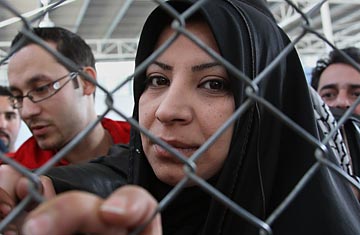
An Iraqi refugee waits to receive food rations at a United Nations center in Douma, Syria.
If the surge of violence in Iraq hasn't changed the Obama Administration's plans to withdraw American troops from the country, it has certainly forced many Iraqi refugees to put off plans to return to the country. A series of bombings across Iraq in April killed more than 200, the highest monthly body count in roughly a year. Andrew Harper, head of the Iraq Support Unit created by the U.N. High Commissioner for Refugees (UNHCR), told TIME that the rate of refugee return slowed dramatically in April. And a "significant number" of returnees have turned around and fled the country again.
The rise in violence is also a quandary for Iraq's neighbors, which play reluctant host to the refugees. The exact number of refugees is hard to gauge, but the Iraqi government estimates there are 2 million. The majority of them live in Syria and Jordan, which are struggling with weak economies and mounting joblessness among their own populations. Government officials in Damascus and Amman have been counting on the improving security environment in Iraq to persuade many refugees to go home. Aid workers in both countries say many refugees are being pressured to leave. (See pictures of the recent revival of daily life in Iraq.)
The Iraqi government says fewer than 1% of the refugees have returned home. (The International Organization for Migration estimates that 18% of the 1.6 million internally displaced Iraqis have returned to their original homes.) Few refugees have signed up for the UNHCR's own programs offering financial assistance and subsidized transportation for those wanting to return. Many of those who do go back don't inform the U.N. unit, for fear of being taken off its refugee register. "They want to keep options open," Harper says. (See pictures of the Iraqi man whose job is to bury Baghdad's unclaimed dead.)
But some options may soon disappear. The UNHCR this week announced that since the overall level of violence in Iraq had waned, it is no longer recommending that most Iraqis get automatic refugee status abroad. Instead, they should be individually interviewed to determine their status, the Geneva-based agency said.
Although the U.N. agency has warned that its new guidelines don't mean Iraq has turned a corner, aid workers fear that's exactly how they will be taken by officials in Damascus and Amman — with dire consequences for the refugees. "I'm wary that this will be interpreted by asylum countries that it's O.K. to return Iraqis forcibly," says Bob Carey, vice president for resettlement and migration policy at the International Rescue Committee (IRC).
The UNHCR also warned that the provinces of Baghdad, Diyala, Kirkuk, Nineveh and Salahuddin are still very dangerous. Those provinces account for the vast majority of the refugees. Indeed, three-fourths of all refugees are from the capital alone. "It's is the epicenter of the whole displacement," says Harper. As a result, bombings in Baghdad resonate across the refugee community. (See pictures of the renewal of the southern city of Basra.)
And where the violence has dramatically waned, like the southern provinces, the UNHCR says some people remain vulnerable for reasons of religious, ethnic or professional affiliation, or sexual orientation. These include government officials and aid workers, journalists, those who have worked with multinational forces and foreign companies, and homosexuals. "It is a very fragile situation," says Harper.
— With reporting by Mark Kukis/Baghdad
